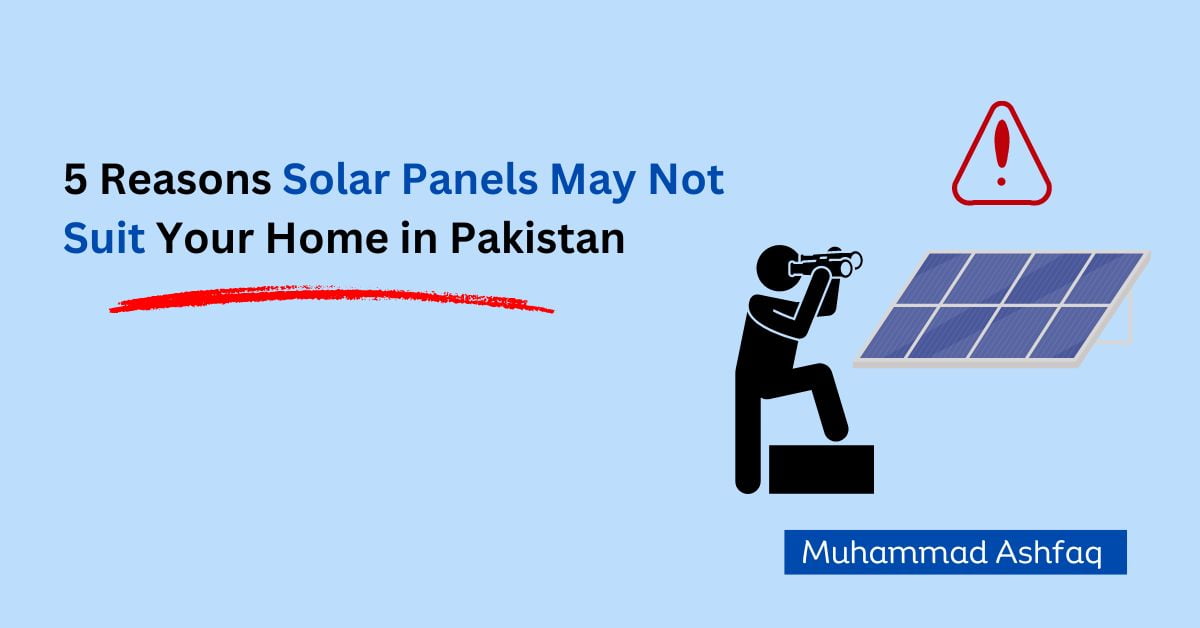Think Twice: 5 Reasons Solar Panels May Not Suit Your Home
Are you considering installing solar panels on your home in Pakistan?
While solar power is a great option, it may not be the best fit for every family.
As solar is not a one-size-fits-all product.
In this blog post, I’ll dig into five key reasons why solar panels may not be suited for your home.
Limited Roof Space and Orientation
Many residences in Pakistan, mainly in urban areas, don’t have enough open roof areas to accommodate solar panel systems.
And if your roof isn’t positioned to maximize sun exposure, the panels won’t be able to do their job efficiently.
Another challenge in Pakistan: it’s common for people to rent out the second or third floors of their properties.
This can create complications when it comes to installing solar panels, as the roof access and ownership become more complicated.
Another factor is the issue of shading.
For solar panels to work at their best, they must be oriented towards the south, which may not be possible if your home’s roof is blocked by neighboring buildings or structures (billboards).
Even a small amount of shading can reduce the efficiency of your solar system.
So, work out these things before installing panels on your roof.
Energy Needs and Usage Patterns
Being Pakistani, I understand the unique energy challenges we face.
While solar panels have become increasingly famous, they may not be suitable for every home in our country.
The thing is, your energy needs and usage patterns play a big role.
- Solar will likely cost you more in the long run if your usage is high at night and low during the day. Solar panels generate the most power when the sun is shining, but that’s not when you need it the most, right?
- Many of us have high electricity demands, often running multiple air conditioners. This level of usage can test the capabilities of a solar panel system, especially during the peak summer months.
Now, I’m not saying solar is a bad idea at all.
It can be a great choice for some homes. But before you jump in, it’s important to consider your unique energy usage patterns and needs.
Also Explore: 5 Most Used 540-Watt Solar Panel Prices in Pakistan
You Plan to Move or Sell Your Home
If you’re planning to move or sell your home soon.
Then keep these things in mind.
First and foremost, the lifespan of solar panels is typically around 25-30 years.
So, if you’re only going to be in your home for a few years, you will not get the long-term savings of your system.
Additionally, potential buyers may not be as interested in a home with existing solar panels as they may prefer to choose their own energy setup.
At the end of the day, the choice is yours.
My advice is to carefully consider your short-term and long-term plans for the home before making such a significant investment.
Insufficient Sunlight Availability
One key factor to consider is the availability of sunlight in your area.
Cities like Islamabad, Karachi, Quetta, and Lahore receive a good amount of solar irradiation, averaging 5-6 kWh/m2 per day, making them well-suited for solar power.
Some regions in Pakistan may experience more cloud cover, shorter daylight hours, or other factors that can impact the effectiveness of solar panels.
Gilgit-Baltistan and Azad Kashmir may not have the same level of sunlight availability.
It’s essential to evaluate your local weather conditions before deciding to install solar panels.
You Want to Export More Than You Use Yourself
Trying to export excess solar power back to the grid does not pay off, as the solar payback rate in Pakistan is already quite low.
And as the government continues to make capacity payments to IPPs, this payback rate may decrease even further.
This means that if you install a large solar panel system with the intention of selling electricity, you may end up disappointed.
The system size larger than what you actually need will lead to wasted assets.
Instead, I’d recommend taking a more balanced approach. Focus on sizing your solar panel system to meet your household’s energy needs, rather than trying to maximize export.
This will ensure you get the most value out of your investment.
Concluding Thoughts
In this post, we’ve explored 5 key reasons why solar panels may not be the ideal solution.
As you weigh the pros and cons, remember that the decision to go solar is highly personal.
What works great for your neighbor may not be the right fit for your home and lifestyle.
Be sure to assess your unique situation.
That’s it for now.
Frequently Asked Questions
After about 20 to 25 years, solar panels may still function but will typically produce less electricity due to degradation.
The payback period for solar panels in Pakistan typically ranges from 3 to 7 years, depending on factors like system size, location, and energy consumption.
Yes, solar panels have a promising future, with advancements in technology expected to enhance efficiency and reduce costs.
A major disadvantage of installing solar panels is the high upfront cost, which can deter homeowners despite the long-term savings on electricity bills.

Content Writer | Assistant Manager (Electrical) at IESCO
As a passionate content writer, I’m on a mission to make solar hassle-free for you through my expert guides and easy-to-digest content.

